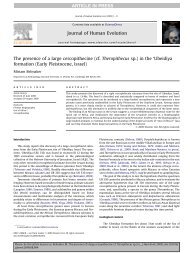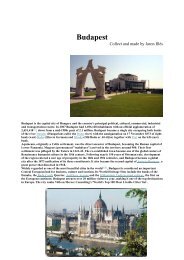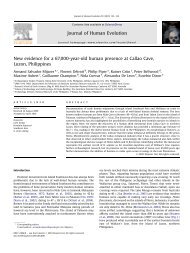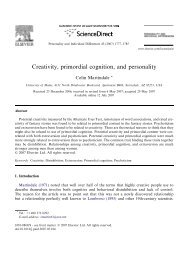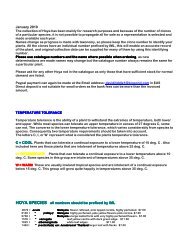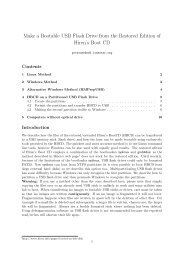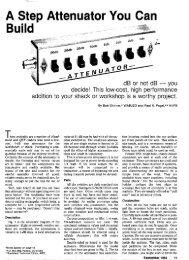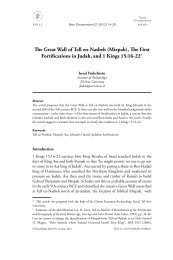David in the Service of King Achish of Gath: Renegade to His ...
David in the Service of King Achish of Gath: Renegade to His ...
David in the Service of King Achish of Gath: Renegade to His ...
Create successful ePaper yourself
Turn your PDF publications into a flip-book with our unique Google optimized e-Paper software.
90 Y. Shemesh / Vetus Testamentum 57 (2007) 73-90<br />
asylum <strong>in</strong> Philistia. If so, we must read <strong>David</strong>’s compla<strong>in</strong>t that <strong>Achish</strong> distrusts<br />
him (1 Sam. xxix 8) as <strong>the</strong> pretense <strong>of</strong> someone who knows that <strong>the</strong><br />
decision <strong>to</strong> exclude him from <strong>the</strong> battle has already been taken and that noth<strong>in</strong>g<br />
he says will change it. 38 On <strong>the</strong> o<strong>the</strong>r hand, perhaps <strong>David</strong> wanted <strong>to</strong> be<br />
present at <strong>the</strong> battle so that he could turn aga<strong>in</strong>st <strong>the</strong> Philist<strong>in</strong>es, br<strong>in</strong>g vic<strong>to</strong>ry<br />
<strong>to</strong> Israel, and <strong>the</strong>reby res<strong>to</strong>re his relations with Saul, as <strong>the</strong> Philist<strong>in</strong>e<br />
commanders ma<strong>in</strong>ta<strong>in</strong>; 39 if so, his s<strong>in</strong>cere attempt <strong>to</strong> persuade <strong>Achish</strong> <strong>to</strong><br />
change his m<strong>in</strong>d fails.<br />
In ei<strong>the</strong>r case, his dismissal proved opportune, as he must have realized<br />
when he returned <strong>to</strong> Ziklag and discovered what had happened <strong>the</strong>re <strong>in</strong> his<br />
absence (1 Sam. xxx). 40 But <strong>in</strong> addition <strong>to</strong> <strong>the</strong> short-term relief for himself<br />
and his men—rescu<strong>in</strong>g <strong>the</strong>ir wives and children who had been captured and<br />
led away by <strong>the</strong> Amalekites—<strong>David</strong>’s absence from <strong>the</strong> battle was necessary<br />
for <strong>the</strong> realization <strong>of</strong> <strong>the</strong> div<strong>in</strong>e plan, as announced by Samuel <strong>to</strong> Saul: Israel’s<br />
defeat by <strong>the</strong> Philist<strong>in</strong>es and <strong>the</strong> fall <strong>of</strong> <strong>the</strong> House <strong>of</strong> Saul, on <strong>the</strong> one hand,<br />
and <strong>the</strong> advent <strong>of</strong> <strong>the</strong> k<strong>in</strong>gdom <strong>of</strong> <strong>David</strong>, on <strong>the</strong> o<strong>the</strong>r (1 Sam. xxviii 16-19).<br />
Many scholars see <strong>David</strong>’s dismissal by <strong>Achish</strong> (1 Sam. xxix) and his war<br />
aga<strong>in</strong>st <strong>the</strong> Amalekites immediately <strong>the</strong>reaft er (1 Sam. xxx) as apologetic<br />
tales <strong>in</strong>tended <strong>to</strong> provide <strong>David</strong> with an alibi and make it clear that he had no<br />
part <strong>in</strong> <strong>the</strong> Israelites’ defeat and Saul’s death, s<strong>in</strong>ce he was far from <strong>the</strong><br />
battlefield. Perhaps, though, <strong>the</strong>se <strong>in</strong>cidents do just <strong>the</strong> opposite and are<br />
meant as an apologia for <strong>David</strong>’s failure <strong>to</strong> participate <strong>in</strong> <strong>the</strong> battle aga<strong>in</strong>st<br />
<strong>the</strong> enemies <strong>of</strong> his lord <strong>the</strong> k<strong>in</strong>g, Saul, and turn aga<strong>in</strong>st <strong>the</strong> Philist<strong>in</strong>es, as <strong>the</strong><br />
Israelites might have hoped and as <strong>the</strong> Philist<strong>in</strong>e commanders expected and<br />
feared he would. Th ese s<strong>to</strong>ries make it clear that circumstances beyond<br />
<strong>David</strong>’s control (though absolutely <strong>in</strong> <strong>the</strong> control <strong>of</strong> God, who pulls <strong>the</strong><br />
str<strong>in</strong>gs) sent him far away from <strong>the</strong> battlefield and prevented him from realiz<strong>in</strong>g<br />
his plan <strong>to</strong> serve as a fift h column <strong>in</strong> <strong>the</strong> Philist<strong>in</strong>e army and save Saul<br />
and Israel.<br />
38) Th is is <strong>the</strong> predom<strong>in</strong>ant view <strong>in</strong> <strong>the</strong> literature. Most scholars hold that <strong>David</strong> was relieved<br />
because he would not have <strong>to</strong> fight aga<strong>in</strong>st Saul and Israel or because he was freed <strong>of</strong> <strong>the</strong><br />
dilemma <strong>of</strong> what he should do dur<strong>in</strong>g <strong>the</strong> battle and <strong>to</strong> whom he should be loyal. As I have<br />
attempted <strong>to</strong> show here, this question does not exist for <strong>the</strong> biblical narra<strong>to</strong>r.<br />
39) Th is possibility is considered by McCarter, I Samuel, p. 427; Gordon, 1 & II Samuel,<br />
p. 198.<br />
40) As noted by Gordon, 1 & II Samuel, p. 198.




